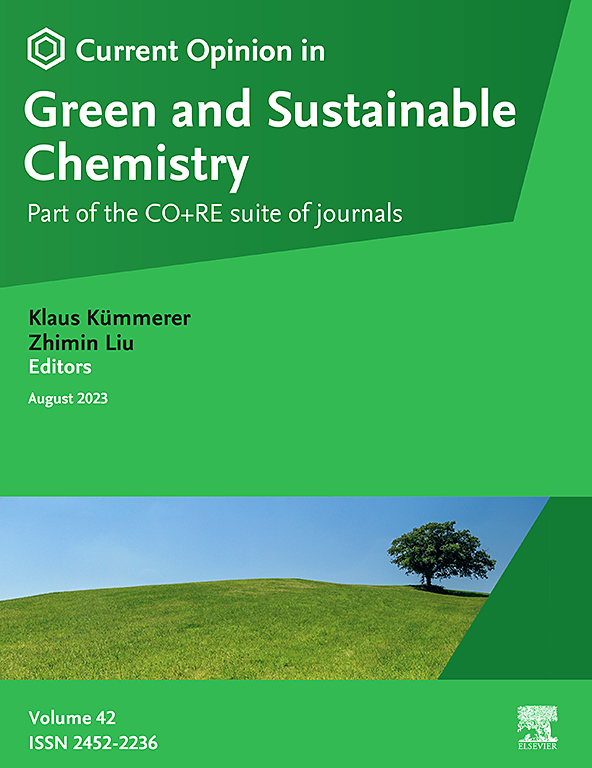Green chemistry transformation: Resolving apparent incompatibilities in ecohumanism and ecomodernism in an innovation systems dynamics perspective
IF 9.3
2区 化学
Q1 CHEMISTRY, MULTIDISCIPLINARY
Current Opinion in Green and Sustainable Chemistry
Pub Date : 2025-03-04
DOI:10.1016/j.cogsc.2025.101015
引用次数: 0
Abstract
At the beginning of the 21st century a new dedication towards sustainability is obligatory and asks for a fundamental reorganization or complete replacement of established innovation systems. Such a process is steered by technology philosophy. The article explores and resolves the seeming differences between ecohumanism and ecomodernism by applying a dynamic perspective of emerging innovation systems. In the very early phases, where the general dedication, search heuristics and relevant knowledge space is determined, ecohumanism should shape the sustainability dedication by establishing general rules respecting the fundamental importance for subsequent innovation. Ecomodernism then helps in both the following explorative phases to effectively guide progress, as well as in the more and more exploitative phases to efficiently guide progress within these general rules. This dynamic combination of ecohumanistic and ecomodernistic thinking demonstrates how a mandatory sustainability focus can be implemented without falling back to a naive techno-optimistic view. The article highlights the relevance of our approach for green chemistry. The principles of green chemistry provide ecohumanist guideposts for technologies currently in the stage of ecomodernist intensification.
绿色化学转型:在创新系统动力学的视角下解决生态人文主义与生态现代主义的明显不相容
在21世纪初,对可持续发展作出新的贡献是义不容辞的,这要求对现有的创新体系进行根本性的重组或完全取代。这样的过程是由技术哲学引导的。本文运用新兴创新系统的动态视角,探讨并解决了生态人文主义与生态现代主义之间的表面差异。在非常早期的阶段,一般的奉献,搜索启发式和相关的知识空间是确定的,生态人文主义应该通过建立尊重后续创新的基本重要性的一般规则来塑造可持续性奉献。因此,生态现代主义有助于在接下来的探索阶段有效地指导进步,也有助于在越来越多的开发阶段在这些一般规则下有效地指导进步。这种生态人文主义和生态现代主义思想的动态结合,展示了强制性的可持续发展重点如何得以实施,而不会陷入天真的技术乐观主义观点。这篇文章强调了我们的方法与绿色化学的相关性。绿色化学原理为当前处于生态现代主义强化阶段的技术提供了生态人文主义的路标。
本文章由计算机程序翻译,如有差异,请以英文原文为准。
求助全文
约1分钟内获得全文
求助全文
来源期刊

Current Opinion in Green and Sustainable Chemistry
Chemical Engineering-Catalysis
CiteScore
16.00
自引率
2.20%
发文量
140
审稿时长
103 days
期刊介绍:
The Current Opinion journals address the challenge specialists face in keeping up with the expanding information in their fields. In Current Opinion in Green and Sustainable Chemistry, experts present views on recent advances in a clear and readable form. The journal also provides evaluations of the most noteworthy papers, annotated by experts, from the extensive pool of original publications in Green and Sustainable Chemistry.
 求助内容:
求助内容: 应助结果提醒方式:
应助结果提醒方式:


